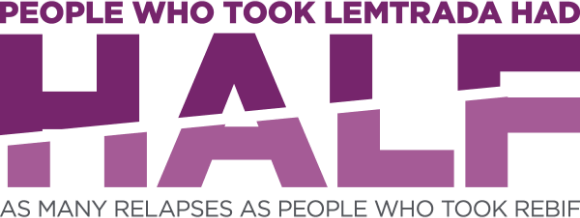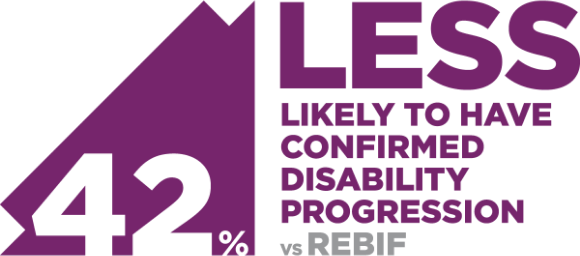LEMTRADA CAN HELP
REDUCE RELAPSES*
*In two 2-year clinical trials against Rebif® (interferon beta-1a) 44 mcg


The annual relapse rate was 0.26 for LEMTRADA vs 0.52 for Rebif.
Patients were treated with LEMTRADA for 2 years and were then invited to continue in an Extension Study for an additional 4 years, for a total of 6 years in the studies.

who took LEMTRADA were living relapse-free at 2 years vs nearly 1 out of 2 people who took Rebif.

The annual percentage of people in the Extension Study who took LEMTRADA and were living relapse-free ranged from
There were 628 people in the 2-year study (Study 1), with 426 taking LEMTRADA and 202 taking Rebif. 9 out of 10 people (387) who took LEMTRADA entered the Study 1 Extension, with most (332) continuing through 4 years.
LEMTRADA MAY SLOW DISABILITY PROGRESSION
INFORMATION IN
STUDY 1


INFORMATION IN
STUDY 1
13% of patients who took LEMTRADA experienced confirmed disability progression† compared with 21% of those who took Rebif.
A separate study in patients showed no statistically significant difference in confirmed disability progression between LEMTRADA and Rebif.
†Confirmed disability progression was defined as at least a 1-point increase (1.5 for patients starting at 0) on the Expanded Disability Status Scale (EDSS) that lasts for 6 months.
INFORMATION IN
STUDY 1

who were in the Extension Study had no confirmed disability progression.
Listed below are tertiary results from LEMTRADA clinical trials. Tertiary results are not tested for statistical significance. No definitive conclusions about treatment effects of LEMTRADA or Rebif can be drawn from these tertiary data.
At year 2, 85% of patients who took LEMTRADA had stabilized or improved disability vs 75% of people who took Rebif.
| LEMTRADA | Rebif | |
| 28.8% | Improved Disability | 16.0% |
| 55.9% | Stabilized Disability | 58.9% |
| 15.3% | Worsened Disability | 25.1% |
At year 6, 77% of patients who took LEMTRADA had stabilized or improved disability.
| LEMTRADA | ||
| 23.6% | Improved Disability | |
| 53.7% | Stabilized Disability | |
| 22.7% | Worsened Disability |
IMPROVED DISABILITY
1-point or greater decrease in EDSS score.
STABILIZED DISABILITY
Change in EDSS score of 0.5 points or less.
WORSENED DISABILITY
1-point or greater increase in EDSS score.


